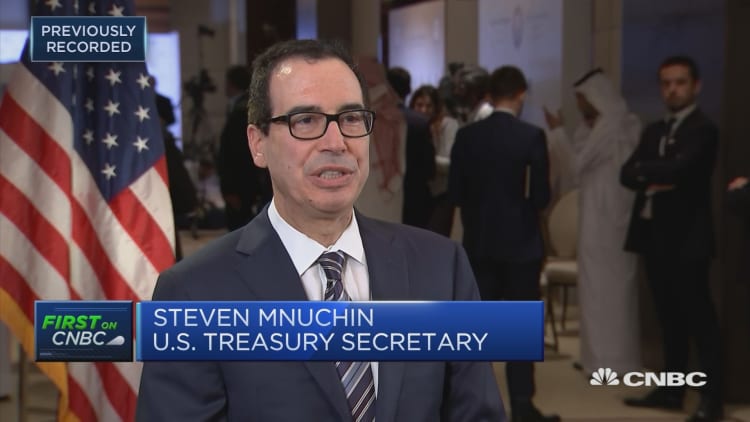
U.S. Treasury Secretary Steven Mnuchin believes the latest round of economic sanctions against Iran must be working, citing the recent backlash from Tehran's leadership as proof.
President Donald Trump announced fresh sanctions on the Islamic Republic on Monday, following the downing of an unmanned American drone last week.
The U.S. president also warned an Iranian attack on Americans would be met with "great and overwhelming force" and "obliteration."
Iran responded to the additional sanctions by calling them "outrageous and idiotic" and suggested the White House was suffering from a "mental illness."
"That must mean that they are working if they are this upset about these sanctions. That's an acknowledgement that they are working," Mnuchin told CNBC's Hadley Gamble in Manama, Bahrain on Wednesday.
US will sanction close to 100% of Iran's economy
Tensions between the U.S. and Iran have spiked since May 2018, when Trump withdrew from the 2015 nuclear deal and reinstated sweeping sanctions on the country.
Iran scaled back some of its commitments under the landmark accord last month, including on the amount of low enriched uranium it is allowed to stockpile, after Trump ended exemptions from U.S. sanctions for countries still buying Iranian crude.
The Trump administration hopes additional sanctions on Iran will force the country to negotiate, with U.S. National Security Advisor John Bolton saying Washington would be prepared to go further in order to get Iran to the table.
"The president is willing to have conversations on the one hand — and doesn't want war — but the president is also determined to enforce the U.S. and our allies' interests in the region," Mnuchin said.
When asked whether he was concerned the U.S. was running out of room to maneuver when it comes to economic sanctions on Iran, Mnuchin replied: "I don't think so at all."
U.S. Secretary of State Mike Pompeo said earlier this week that more than 80% of Iran's economy is currently under sanction.
"They are at about 80% now, we will ramp them up close to 100%," Mnuchin said, before adding the White House would allow for "humanitarian activities" in an effort not to punish the people of Iran.
"Our issue is that there is really bad behavior. They are sponsoring terrorism throughout the region, they are creating instability in this region, they are endangering our partners and our allies and our interests. We will not stand for that," he added.
'Very big mistake'
Washington has applied financial restrictions to nearly 1,000 Iranian entities, including banks, individuals and vessels tied to the country's shipping and energy sector. In May, the White House prohibited the purchase of Iranian iron, steel, aluminum and copper.
The Trump administration has also revoked waivers that allowed eight countries, including China and India, to import Iranian oil despite U.S. sanctions. The U.S. is aiming to completely cut off Iranian oil exports in order to force Tehran to abandon support for militant groups in the Middle East and renegotiate the landmark nuclear accord.
Last week, U.S. officials said an Iranian surface-to-air missile shot down an American military surveillance drone over the Strait of Hormuz — the world's busiest transit lane for seaborne oil shipments. Iran said the aircraft violated its airspace. Hours later, Trump said Iran made a "very big mistake" by shooting down the spy drone.
Trump approved military strikes on Iran on Thursday before calling them off, saying the attack would have been disproportionate to Iran's downing of an unmanned American surveillance drone.
On Tuesday, Trump threatened to attack Iran in retaliation for any strikes by Tehran "on anything American." This came after Iran's President Hassan Rouhani questioned the mental competence of the U.S. president.


